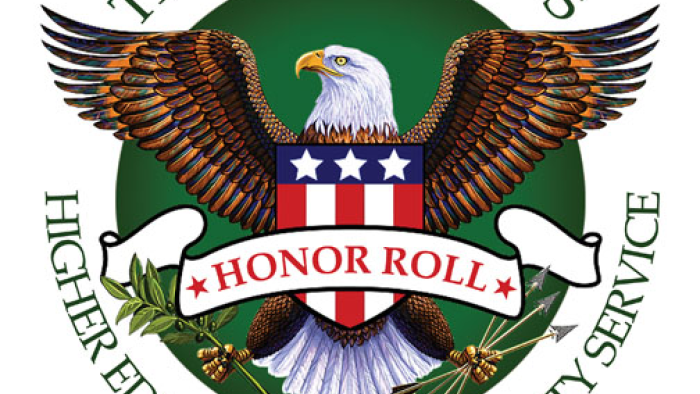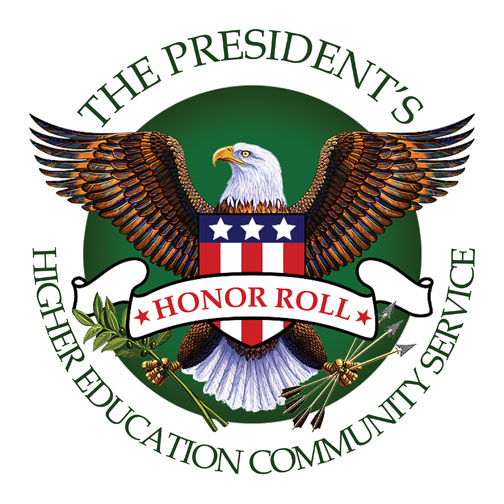
At a glance
 Alfred State was admitted to the 2010 President’s Higher Education Community Service Honor Roll for engaging its students, faculty, and staff in meaningful service that achieves measurable results in the community.
Alfred State was admitted to the 2010 President’s Higher Education Community Service Honor Roll for engaging its students, faculty, and staff in meaningful service that achieves measurable results in the community.

 As colleges across the country honor their graduates this commencement season, the Corporation for National and Community Service (CNCS) honored Alfred State College as a leader among institutions of higher education for its support of volunteering, service-learning, and civic engagement. Alfred State was admitted to the 2010 President’s Higher Education Community Service Honor Roll for engaging its students, faculty, and staff in meaningful service that achieves measurable results in the community.
As colleges across the country honor their graduates this commencement season, the Corporation for National and Community Service (CNCS) honored Alfred State College as a leader among institutions of higher education for its support of volunteering, service-learning, and civic engagement. Alfred State was admitted to the 2010 President’s Higher Education Community Service Honor Roll for engaging its students, faculty, and staff in meaningful service that achieves measurable results in the community.
The CNCS, which has administered the Honor Roll since 2006, admitted a total of 641 colleges and universities for their impact on issues from literacy and neighborhood revitalization to supporting at-risk youth. Of that total, 511 were named to the Honor Roll, 114 received the recognition of Honor Roll with distinction, 11 were identified as finalists, and six received the Presidential Award.
"As members of the class of 2011 cross the stage to pick up their diplomas, more and more will be going into the world with a commitment to public service and the knowledge that they can make a difference in their communities through service to others, thanks to the leadership of these institutions," said Patrick A. Corvington, chief executive officer of CNCS. “Congratulations to Alfred State and its students for their dedication to service and commitment to improving their local communities. We salute all the Honor Roll awardees for embracing their civic mission and providing opportunities for their students to tackle tough national challenges through service.”
Institutional Commitment to Service
In 2009-10, Alfred State College (ASC) strengthened its commitment to service by developing a plan to integrate civic engagement and leadership as core elements of the ASC experience. The 21 students on a service immersion in Haiti to engage in rebuilding efforts, animal care, and community education.
“We are pleased and proud to have been named to the President’s Honor Roll for Community Service,” said Alfred State College President Dr. John M. Anderson. “This recognition lets our students know that their contributions matter.”
A total of 851 institutions applied for the 2010 Honor Roll, a nine percent increase over last year, a sign of the growing interest by colleges and universities in highlighting their efforts to engage students in making a difference in the community.
On campuses across the country, millions of college students are engaged in innovative projects to meet local needs, often using the skills learned in classrooms and laboratories. In 2009, 3.2 million college students dedicated more than 307 million hours of service to communities across the country, service valued at more than $6.4 billion.
The Corporation for National and Community Service is a strong partner with the nation’s colleges and universities in supporting community service and service-learning. Last year, CNCS provided more than $215 million in support to institutions of higher education, including grants to operate service programs and the Segal AmeriCorps Education Awards for college tuition and student loan repayment. CNCS is a catalyst for service-learning programs nationwide that connect community service with academic curricula. Through these programs, in classes, and in extracurricular activities, college students serve their communities while strengthening their academic and civic skills.
CNCS oversees the Honor Roll in collaboration with the U.S. Departments of Education and Housing and Urban Development, Campus Compact, and the American Council on Education. Honorees are chosen based on a series of selection factors, including the scope and innovation of service projects, the extent to which service-learning is embedded in the curriculum, the school’s commitment to long-term campus-community partnerships, and measurable community outcomes as a result of the service.
